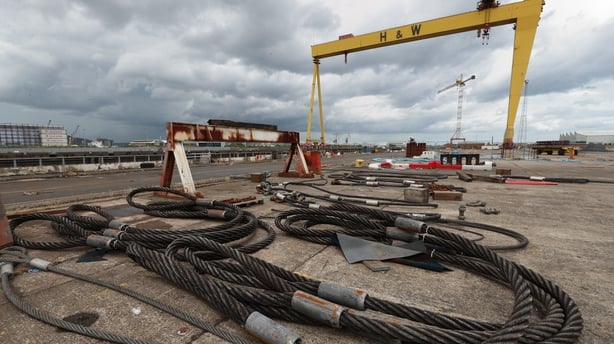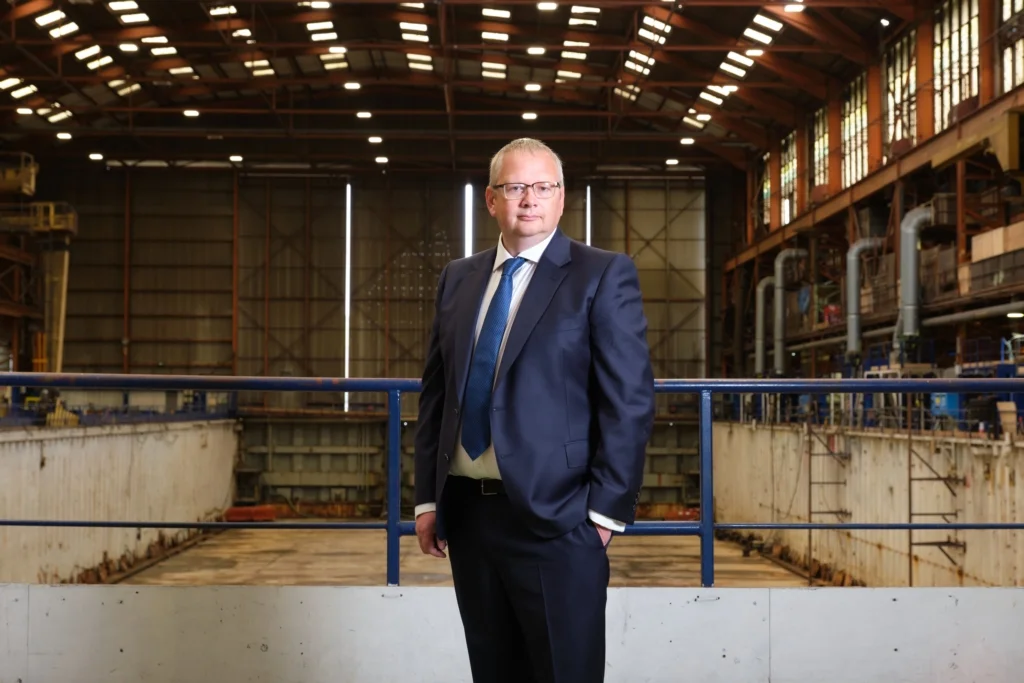En aquel momento advertíamos que el proyecto podía naufragar ante los recurrentes aprietos financieros de la firma y que directivos de la empresa, famosa mundialmente por haber construido el Titanic, advirtieron a funcionarios ingleses que en el “peor de los escenarios, de no poder asegurarse la garantía del crédito por unos 200 millones de libras, conducirá a pérdidas de puestos de trabajo y la necesidad de recortar y reconsiderar algunos proyectos, tales como el referido a las Islas Malvinas”.
El nuevo puerto de grandes dimensiones que el gobierno invasor proyecta en las Islas Malvinas, reemplazará al que funciona desde la época de posguerra y que también fuera construido por los mismos astilleros en la costa de Puerto Argentino. Las nuevas instalaciones portuarias podrán ser utilizadas para actividades vinculadas a la explotación petrolera, pesquera, turismo, ciencia, investigación y defensa.
En marzo, el investigador del CONICET y docente de la Universidad Torcuato di Tella, Daniel Kersffeld, comentó en Página|12 que “la construcción de una obra de infraestructura podría situar en otro nivel la disputa por las Islas Malvinas y por la presencia argentina en el Atlántico Sur”, describiendo que “el nuevo puerto implicará la construcción de cuatro muelles flotantes de amplias dimensiones, que estarán conectados mediante una carretera y una calzada construidas por separado, todo lo cual requerirá de una inversión inicial de más de 150 millones de dólares (120 millones de libras)”.
El diario El Sureño, planteó que el gobierno de ocupación pretende “tener una estructura de reemplazo para fines de 2027, cuando llegue al final de su vida funcional. La nueva instalación también será un sistema de muelle flotante y estará en la misma ubicación. Los requisitos para las nuevas instalaciones se establecieron en consulta con las industrias que dependen del puerto”.
Kersffeld considera que Harland & Wolff se afianzó como una de las más importantes empresas vinculada a la industria de la defensa y a la geopolítica británica, condición que permitió rescatarla frente a recurrentes amenazas de quiebra por deficientes o fallidas operaciones comerciales. En los últimos tiempos, los emblemáticos astilleros mantuvieron “una creciente intervención en la industria militar de la OTAN, ya sea apoyando a las autoridades británicas, como así también a otros gobiernos asociados a la alianza atlántica”.
Queda claro que la injerencia de Harland & Wolff en la construcción del nuevo puerto en Malvinas con capacidad de alojar barcos de gran calado e incluso submarinos implicará, por último, una mayor intervención en la región de la OTAN y también de la alianza militar conformada por Australia, Reino Unido y Estados Unidos (AUKUS por su sigla en inglés). Según el investigador del CONICET “pese a sus actuales debilidades, el Reino Unido está tratando de fortalecer su presencia en el Atlántico Sur para, de ese modo, reinventar un imperio añejo, prácticamente oxidado”, afirmando que “al parecer, no estaría sólo en esa tarea”.
Las dificultades financieras
A principios de febrero, el diario El Cronista informaba que Harland & Wolff había firmado un contrato para construir tres buques de apoyo para la Marina Real. También trascendió que no lo haría sola, ya que para poder cumplir con el pedido, los astilleros se asociaron con la empresa estatal española Navantia -a través de la empresa subsidiaria, Navantia UK- y con la empresa británica, BMT Group. Cabe destacar que Harland & Wolff no ha construido ningún barco desde 2003, pero igualmente el gobierno británico le otorgó el jugoso contrato por 1600 millones de libras (cerca de 2000 millones de dólares).

Poco después, el Financial Times publicaba que “el Tesoro tiene reservas sobre la aprobación de un préstamo garantizado de 200 millones de libras respaldado por los contribuyentes”, en beneficio de Harland & Wolff, “mientras que tres ministerios rivales (Defensa, Comercio y Negocios, y la Oficina de Irlanda del Norte) están dispuestos a seguir adelante”.
La disyuntiva es grande y abre una brecha en el seno del gabinete británico, ya que Harland & Wolff tiene un competidor sólido, el consorcio británico formado por Babcock International, BAE Systems, Cammell Laird y Rolls-Royce, conocido como Team UK, que fuera uno de los cuatro consorcios que quedaron como finalistas en la licitación de la Marina Real y que, según trascendió últimamente en redes sociales, sigue de cerca los avatares que puedan acontecer con el negocio que el Ministerio de Defensa de Reino Unido otorgara a Team Resolute como licitador preferente del programa para construir tres buques logísticos a la Flota Auxiliar de la Marina Real.
La amenaza de huelga
A los problemas financieros se sumó en junio el conflicto en ciernes que Harland &Wolff tiene con sus trabajadores. A mediados de mes pasado comenzaron las conversaciones con el sindicato ya que los trabajadores votaron a favor de la huelga en una disputa salarial que amenaza con paralizar al constructor naval. La noticia fue reflejada por el Financial Times y expresa la preocupación existente en el Reino Unido.
La presión de los trabajadores del gigante de Belfast, sumada a la incertidumbre respecto a las dificultades financieras y garantías de préstamos que no llegan, llevaron al presidente ejecutivo de Harland & Wolff, John Wood, a reconocer públicamente que deberán “cambiar de estrategia”.
El sindicato denuncia que el último acuerdo salarial venció en diciembre y que al momento no prosperó un nuevo acuerdo y exige que de alcanzarse sea retroactivo a enero para todo el personal de Harland & Wolff.

Wood manifestó al Financial Times que todavía tiene esperanzas de asegurar la garantía de desarrollo de las exportaciones antes de las elecciones generales del 4 de julio, a pesar de las ya inocultables divisiones en el gabinete británico que no se pone de acuerdo respecto a otorgar el préstamo que reclaman los históricos astilleros para afrontar y cumplir sus obligaciones.
“La brutal realidad es que, sin Harland & Wolff… el Reino Unido no puede cumplir con su compromiso con la defensa” sostuvo Wood en una entrevista, agregando que la empresa constituye “un activo estratégico para cualquier partido político que forme el próximo gobierno”.
Fuentes:






